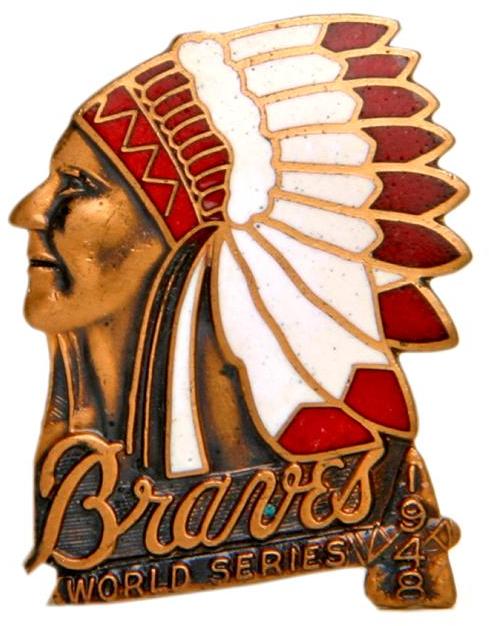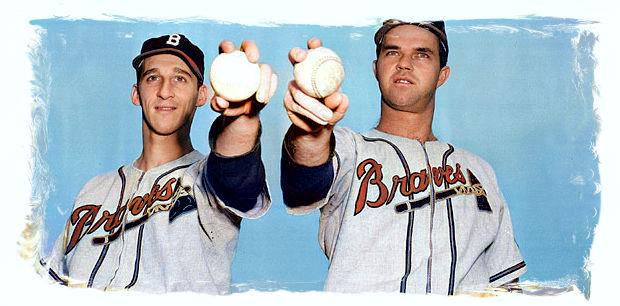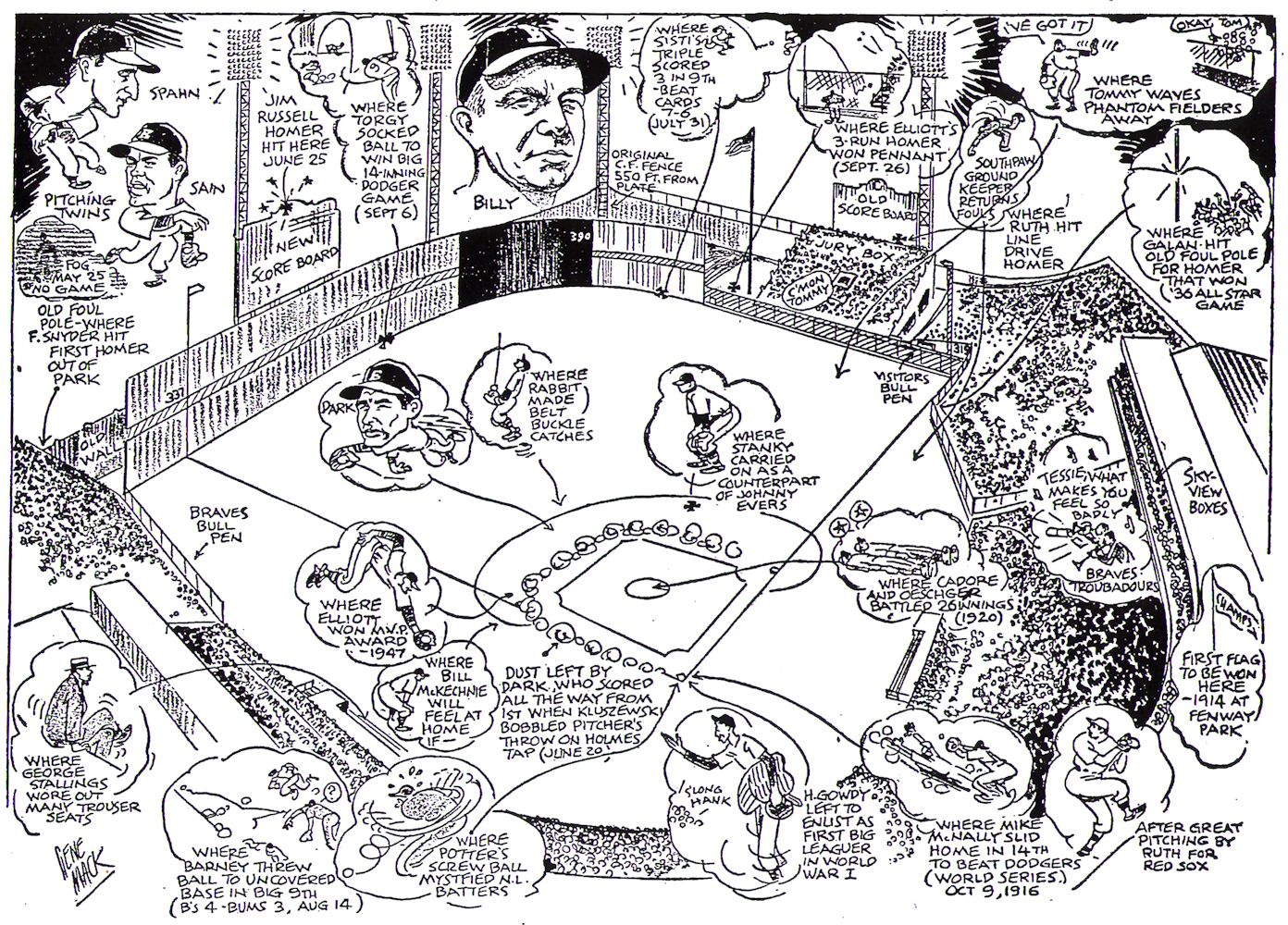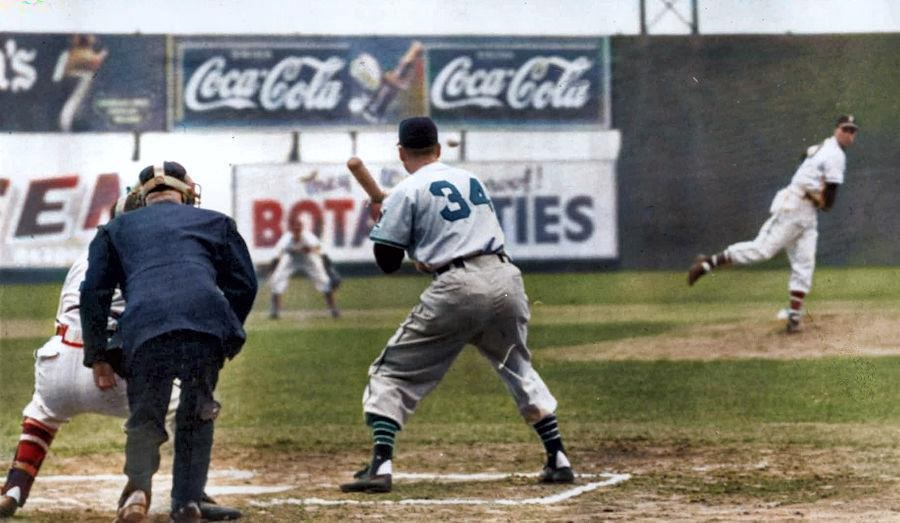|
1948 BOSTON BRAVES
SPAHN & SAIN and PRAY FOR RAIN ...
The 1948 Braves were strengthened in every department over the
1947 team. For the outfield they bought slugger
Jeff Heath from the St.
Louis Browns, got Jim Russell from Pittsburgh, and drafted
Clint Conaster
from Buffalo. The infield had a new keystone combination consisting of
Alvin
Dark, a rookie shortstop acquired from Milwaukee to play alongside
secondbaseman Eddie Stanky. New pitcher's included
Vern Bickford, a
competitive right-hander from Milwaukee,
Bobby Hogue, a relief pitcher
from Dallas, and in June, they picked up
Nelson Potter. To help
Phil Masi
with the catching, Bill Salkeld had been picked up from Pittsburgh.
|
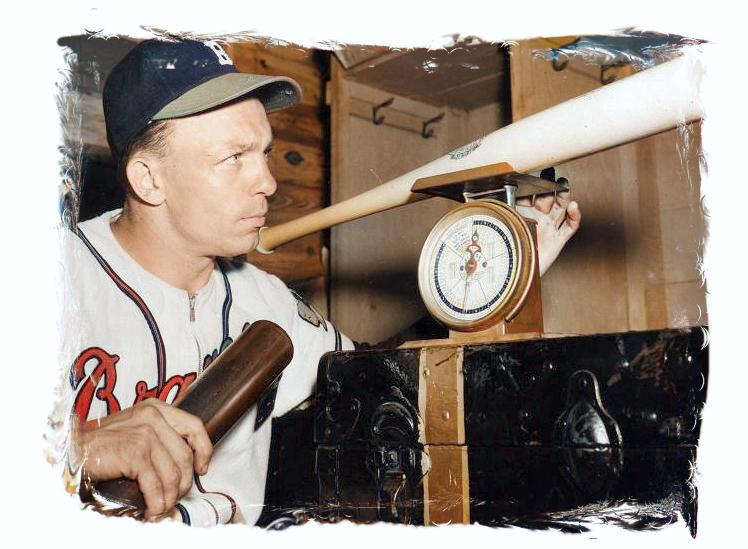 |
|
ALVIN DARK |
This gave Billy Southworth a team experienced, but still with the
question of whether, the veterans would have good seasons once again, and
would the Alvin
Dark
come through at shortstop.
Dark, while not the slickest
fielding shortstop in Braves history, was an outstanding competitor, the
kind that would go from first the third on a bunt or cash a pop fly with
his bare hands. A Marine flyer during the war,
Dark
signed with the Braves
for $40,000 in 1946. In 1947 he helped Milwaukee win the American
Association playoffs.
Southworth
did a great job of bringing the Braves players together,
most of whom were veterans who had some limitations in one department or
the other. The brusque a little manager manipulated his lineup so as to
get the maximum results with the talent at his disposal.
The National League's most valuable player in 1947 was
Bob Elliott. His average
dropped to .283 in 1948, but he knocked in 100 runs and hit 23 home runs.
|
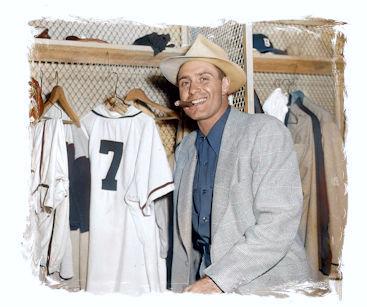 |
|
SIBBY SISTI |
Until he broke his ankle in midseason,
Eddie Stanky
was the spark plug.
When he was hurt, Sibby Sisti step in at second base and played as he
never had before and never would again. The Braves did as well with
Sisti
as they did with
Stanky, and some objected when
Stanky
returned to the
lineup for the World Series.
Tommy Holmes
not only led
the team in hitting with a .325 average, but he actually saved the Braves
four straight losses in St. Louis when he threw out Stan Musial at the
plate from right-field in the ninth-inning.
Earl Torgeson and
Phil Masi
both slumped, batting .253, but they played steady defense and Torgy was
safe the first 14 times he tried to steal a base.
Where the Braves really excelled was in the pitching department.
Warren Spahn was the
southpaw ace, winning 15 games, and
Vern Bickford
had an 11-5 record in
his first season. The big wheel however, was
Johnny Sain, whose 24�15
record made him a 20 game winner for the third successive season.
The Braves led the National League just about all summer and held off a
charge by the Dodgers at the end of the season, to win the pennant by 6
1/2 games.
The road to the pennant began in Florida. The Braves returned to
Bradenton after spending the previous two spring trainings in Ft.
Lauderdale. The Braves made headlines on March 6th when they
acquired secondbaseman
Eddie Stanky
from the Dodgers.
Manager
Billy Southworth
was a by-the-book regimentarian, using a clip
board and a stop-watch to judge his recruits. They were broken up
into groups and followed a regular practice schedule. Practice ended
at 4PM and
Southworth
instituted an 11:30 curfew.
The team started off slowly on the road. The Phillies took the
first two games of the season, but the Tribe salvaged the road trip by
taking the third game on April 22nd, before returning back to Boston.
On April 23rd, Braves Field was
decked out in red, white and blue bunting as 11, 553 hearty fans.
The field was in fine shape as the day was cold and chilly. Hank
Gowdy, the former member of the 1914 "Miracle Braves" returned to Braves
Field as a member of the New York Giants coaching staff. The Pat
Sands Orchestra provided some of the music, competing with the infamous
Troubadours for the fans' attention. The Troubadours entertained the
crowd by playing "Three Blind Mice" when the umpiring crew made their
appearance. The Giants, however, scored all the runs they would need
in the first inning against
Warren Spahn. The
Giants ended up sweeping the four game series to give the Tribe their
fifth loss in six games.
The Braves came back to win on April
26th. They handcuffed the National
League champion Brooklyn Dodgers, 5 to 0 on the brilliant three hit
pitching of Bill Voiselle.
Bob Elliott
blasted a long line double off the left-field fence to drive home the
first and only run
Voiselle
needed. In the next game, on
April 27th,
Red Barrett pitched
himself a six hit 3 to 2 victory.
Barrett
had a bit of help from
Bob Elliott, who drove in all the runs.
Warren Spahn shutout the
Phillies, 7-0 at Braves Field on
April 28th. The Braves then went to the Polo Grounds and on
April 30th,
they presented
Johnny Sain
with his first victory of the season. It was a
neat 7 to 2 triumph with three homers.
Tommy Holmes
started the performance by hitting a terrific 375 four drive well up into
the top balcony in left. The second smash was the prize of them all in
that won the ballgame. It was hit by
Bob Elliott
the third inning with two of his teammates aboard. After this,
Jeff Heath
caught a fast pitch and deposited almost into the same spot where
Holmes
had hit his.
On
May 1st
Bobby Hogue
curbed a Giants'
seventh-inning rally to preserve
Bill Voiselle's 6 to 3 victory and knock
New York out of first place. The Braves (6-8) had now won five of their last six, and took two
of three in New York. They were in 5th place, 3 games out of first.
They moved on to Pittsburgh and lost one game and then to Cincinnati
and swept a
rain-shortened two game series from the Reds. On
May 7th,
Bill Voiselle
got his third
straight victory of the season, riding a two run
Eddie Stanky
single in
the sixth inning. They came from behind on
May 8th,
3 to 2, as
Clint Conaster
hit an eighth-inning single to climax a
three-run rally, chasing
Jim Russell
home with the winning run.
Three consecutive shutouts by
Johnny Sain in St. Louis
on
May 10th,
Bill Voiselle
in Chicago
on May 13th and
Warren Spahn in Brooklyn
on May 15th, pushed the Braves up
the standings. They concluded a series in Brooklyn by knocking out
18 hits and scoring 12 runs on
May 17th.
Tommy Holmes'
(.400 BA) hot bat earned him the major league lead in batting in mid May.
The Braves returned home and played .500 baseball.
The lost 2 of 3 to Pittsburgh, but on
May 19th,
Vern Bickford
got the start and pitched a brilliant five
hit, 4 to 1 victory. They split a series with the Cardinals. On May 21st,
Warren Spahn
wrecked the six-game winning streak of the Cardinals, with a 3 to 1
victory over the league leaders.
Spahn
scattered seven base hits and missed a shutout by a single pitch.
After
losing two to the Dodgers, they split a doubleheader with the Phillies on
May 31st. After they blew the opening game, 6 to 3,
Spahn
and a 13 hit barrage ended a four-game losing streak for the Tribe, 10 to
4, as a six run explosion in the fifth inning enabled him to coast home.
The month
ended, with the Braves finishing May with a 17-17 record and in fourth place.
As June began, the Braves got hot, winning 8 out of 10 games. With
Johnny Sain holding the
Pittsburgh Pirates to three scattered hits, and
Jeff Heath
and Earl Torgeson
furnishing the power, the Braves launched their second road trip
with a 5 to 1 win over the Pirates on
June 2nd. Two days later, on June 4th, they exploded with a seven run
seventh inning that enabled them to wipe out a Pirate lead and score a 10
to 7 victory.
Jim Russell's three run homer climaxed the tribes uprising.
After splitting the Pirates series, they swept the Cubs at Wrigley
Field.
Sain (5-4) won his fifth
game, as he put down the Chicago Cubs on four hits with a 1 to 0 victory, on June 6th.
In the second game at Wrigley Field on
June 7th,
Jim Russell
pounded his
way into the baseball record books, as the Braves scored a 9 to 5 victory
over the Cubs. The Braves outfielder hit two home runs, one swinging
right-handed and the other swinging left-handed. On top of the two blasts,
Russell
knocked out a couple of doubles, batted in five runs and scored
three himself as he enjoyed a near perfect day. On
June 8th,
Vern Bickford
threw a four
hitter, giving the Boston Braves a lopsided 11 to 1 demolition of the
hopeless Cubs and the sweep.
On June 9th, the Braves walloped
the Cardinals in St. Louis, by an 11 to 5 score. Fourteen hits bounced off
the Braves bats, along with four St. Louis errors and seven free passes
handed out by the Cardinals pitchers. Then the next night,
June 10th,
Sain put down the
Cardinals on seven hits.
Bob Elliott
ended a long slump by crashing out four hits and drawing a walk. Finally,
on June 11th, the Braves went into
first place after winning six in a row and eight of their last ten.
They staged a sparkling come from behind sweep of the three-game series
with the Cardinals, taking the finale 7 to 3.
After losing
a doubleheader in Cincinnati, the team bounced back to sweep a second
doubleheader on June 13th.
The Braves made a sensational comeback in the first game.
Trailing 6-0 after six innings, they scored four runs in the seventh
and four in the ninth, with the winning run being driven in by
Eddie Stanky
to win, 8 to 7. A three run homer by
Bob Elliott
and a three
run double by Clyde Shoun highlighted the second game, a 10 to 5 victory,
in which Cincinnati ace, Ewell Blackwell was driven to the showers.
They headed back to Boston, tied with the Giants for the National League
leadership. In last place during the first week of the season,
the Braves have made a magnificent drive to the top of the National
League.
Johnny Sain won for the
first time at Braves Field on
June 15th. Then the
Braves staged two come-backs to sweep a doubleheader from the Cubs
on June 17th.
They then came back against the Reds for a 5-4 win on
June 18th. Next, it was
Sain (8-4)
shutting out Cincinnati, 5-0, on
June 19th. During his last five
complete and winning games,
Sain held the
opposing team to just four earned runs.
Backed by the surprisingly good pitching of both
Red Barrett
and Vern Bickford
on June 20th, the Tribe
took both ends of a doubleheader, making it 18 wins in their last 23
games.
Tommy Holmes (.362
BA) continued to lead the Braves hitting attack.
Earl Torgeson
extended his perfect stolen base streak to 14 of 14.
The St. Louis Cardinals next came in and took three straight games, to
sweep the series, only one half game behind the Braves. But the Braves
bounced back, taking 2 of 3 from Pittsburgh. On
June 25th, home runs by
Jim Russell
and
Holmes
led the Braves to a 12 to 3 win. On June
27th, the Braves protected their first place lead with a 9 to 1
victory.
Clint Conaster
knocked in three runs to help
Johnny Sain notched his
ninth victory of the season.
Shoun
knocked home the winning run in the
second inning by drilling a two run single that gave the Braves a 2 to 0
lead.
They next took 2 of 3 from the Giants, to
open a 2 1/2 game lead in the National League, as July began. On
June 30th,
Bill Voiselle
gave the
Braves a 3 to 1 It was his eighth win of the year.
Johnny Sain became the
first National League pitcher to win his 10th game on
July 1st. They finished their
homestand in first place by 2 1/2 games.
The Braves, in fierce competition with other big league teams,
signed an 18-year-old left-handed pitcher who just graduated from high
school. Johnny Antonelli was given a bonus of $52,000. The big outlay of
cash to an untried schoolboy annoyed veteran players. None were more
annoyed than
Johnny Sain and to
appease him the Braves gave him a new contract before the All-Star game
that covered the balance of the 1948 season as well as 1949.
The Braves went on the road to Philly, as July started, taking the
first two games of the series and extending their National League lead to
four games. On July 3rd,
Bob Elliott
smashed two homers. He had four home runs in three successive games.
On July 6th, with
Vern Bickford
pitching four hit ball and
Frank McCormick ripping off his first home run
of the season, the Braves successfully fought a 4 to 3 battle with the
Giants at the Polo Grounds.
Although
Eddie Stanky
broke his ankle in the third inning during a
collision with Brooklyn thirdbaseman, Bruce Edwards on
July 8th at Ebbets Field, the Braves
beat the Dodgers in the final game of the road trip, thanks to
Jim Russell's grand slam.
Stanky
had been scheduled the be the National
League's starting secondbaseman in the All Star Game. The Braves
(43-31) returned home after a .500 road trip still 2 1/2 games in first.
Alvin
Dark
(.333 BA) continued on his
splendid hitting spree. Starting on June 19th he had hit safely in 23
successive games. Over that stretch he had gotten 39 hits in 91 times at
bat for a .425 batting average. In 13 of the games he had connected safely
more than once.
Johnny Sain picked up his 11th victory of the year and turned in his
13th complete game, as he rode to a soft victory over the Phillies by a 13
to 2 score on July 9th. They edged
the Phillies 4 to 3, the next night. Big
Bill Voiselle
came within one out
of racking up his sixth complete game but he was forced out with the tying
run on first in the last of the ninth. In the final game on
July 11th, sparked
by Connie Ryan, filling in for the injured
Eddie Stanky, the Braves
defeated the Phillies 9 to 4 and swept the three-game series.
The Braves, after sweeping the series with the Phillies, held a 5 1/2
game lead over the Pirates at the All-Star break.
Although Boston players figured prominently in the All Star Game, none
did so as dramatically as
Johnny Sain. He relieved
Johnny Schmitz, the Cubs southpaw and losing pitcher, in the fourth
inning. He retired five men in succession before giving away to a
pinch-hitter, striking out three men in row on 13 pitches in the fifth
inning, two of them being Vern Stephens and Bobby Doerr of the Red
Sox.
After the break the Braves went on the road. They took 2 of 3 from the Cubs in Chicago. On
July 16th, the Braves won a
slugfest, 12-10, coming from behind three times for their sixth
consecutive win.
With
Nels Potter and
Vern Bickford pitching superbly, and
Jeff Heath,
Alvin
Dark and
Bob Elliott slamming home
runs, the Braves captured one of their most important doubleheaders of the
season, as they battered the Pirates, 10 to 2 and 3 to 1 on
July 18th.
|
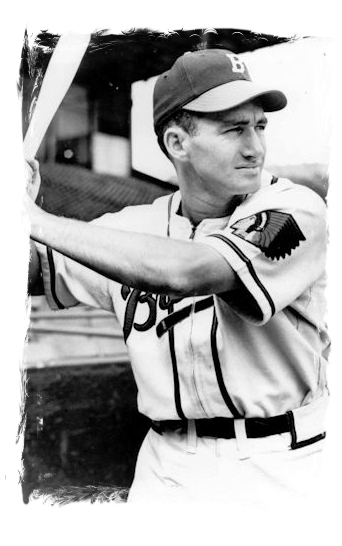 |
|
ALVIN DARK |
The Braves thus zoomed into an eight game lead in the National League
pennant race. They dumped the Pirates into fourth place, 8 1/2 games
behind and gained a full game on both the Cardinals and the Dodgers, who
split a doubleheader in St. Louis.
But the Braves' fortunes started to slide. They won only two of their
last seven decisions on their post All Star Game road trip, finished it
with a 6-6 record, but managed to keep their National League lead at 5
games, thanks to late inning heroics by
Bob Elliott
in their last
game against the Cardinals on July 25th.
Elliott's clutch home run,
with two aboard in the ninth, brought the Tribe back, rescuing them from a
desperate situation, after losing three straight to the second place
Cardinals.
The Braves came home to sweep a series with the Pittsburgh Pirates.
On July 27th, the Braves defeated
the Pittsburgh Pirates behind
Nels Potter's six hit pitching, by a score
of 5 to 1. Ralph Kiner, of the Pirates, hit his 28th home run in the first
inning, but the Braves offset it with a two run round tripper by
Phil Masi, and
Clint Conaster's first big-league homer.
The next day, July 28th, the
Braves hustled and polished off the Pittsburgh Pirates, 8 to 2, behind
Vern Bickford's six hit pitching.
Bill Voiselle
batted and pitched a 2 to 1 triumph over the
Pirates on July 29th. He pounded out his fifth
hit of the season in the second inning, to provide his own winning
margin for his 11th triumph of the year. His pitching in the clutch
was terrific and it overshadowed his stick work, even though his base hit
won the game.
After losing the first game of the series with the Cardinals, the
Braves staged their greatest comeback of the season on
July 31st. A base clearing triple by
the almost forgotten
Sibbi Sisti, in the ninth-inning, gave the Braves a 7
to 6 walkoff win.
But the Braves lost two of three to the Cardinals to start August, then lost three of
four to the Reds. In the final game of the series with the Reds, on
August 5th,
Earl Torgeson
drilled a
hit into left-center for a triple, scoring
Tommy Holmes
and Alvin
Dark
for
a 6 to 4 victory. The hit ended the Braves four-game losing streak. The
relief pitching of
Bobby Hogue, blanked the Reds over the final three
innings, on one infield hit.
The Cubs came in and, after losing the first game, the Braves staged a
seventh-inning rally that dissolved a 3 to 3 deadlock, to score an
impressive 6 to 3 win. It gave
Johnny Sain his long
overdue 14th victory on August 7th.
The next day, the Braves knocked out 10 base hits for a 6 to 3 win over
the Cubs before 41,527 fans at Braves Field that afternoon. It was the
largest crowd to see a game in two seasons.
Bob Elliott
paced the team with a perfect day on a pair of doubles and two passes,
driving in two runs.
Terrific homers by
Elliott
and Jeff Heath
provided the power behind
Sain's 15th win on
August 11th against the Giants. It was a
win that gave them a even split in that series.
On
August 12th,
Sibby Sisti was on third in the ninth inning of a tie
game.
Elliott
came to the plate and Ralph Branca's first pitch was a curveball in the
dirt, that bounced between Roy Campanella's legs all the way to the backstop.
Sisti
charged in from third, sliding underneath Branca for the winning
walkoff run, as the Braves won their opener from the Brooklyn Dodgers with
a 2 to 1 score.
On August 14th, the Braves roared
back in the bottom of the ninth-inning, to get by the Dodgers in an
exciting, 4 to 3, come from behind win. Entering the ninth, the Braves
were two runs down and came up with a thrilling three run rally. The
Braves now had a 17-13 record in one-run games, but won only two of the
five games in the Brooklyn series.
Their lead was dwindling by mid August as
Southworth was booed
after using Al Lyons, a pitcher, as a pinch-hitter for
Jeff Heath. Then
Jim Russell was hospitalized with a heart
condition. The Braves finished their homestand winning 10 of the 20 games. They
had slumped since the All-Star game, starting the second half with a 5 1/2
game lead in the National League. They left Braves Field only 2
games ahead of the Dodgers and 2 1/2 ahead of the Cardinals.
|
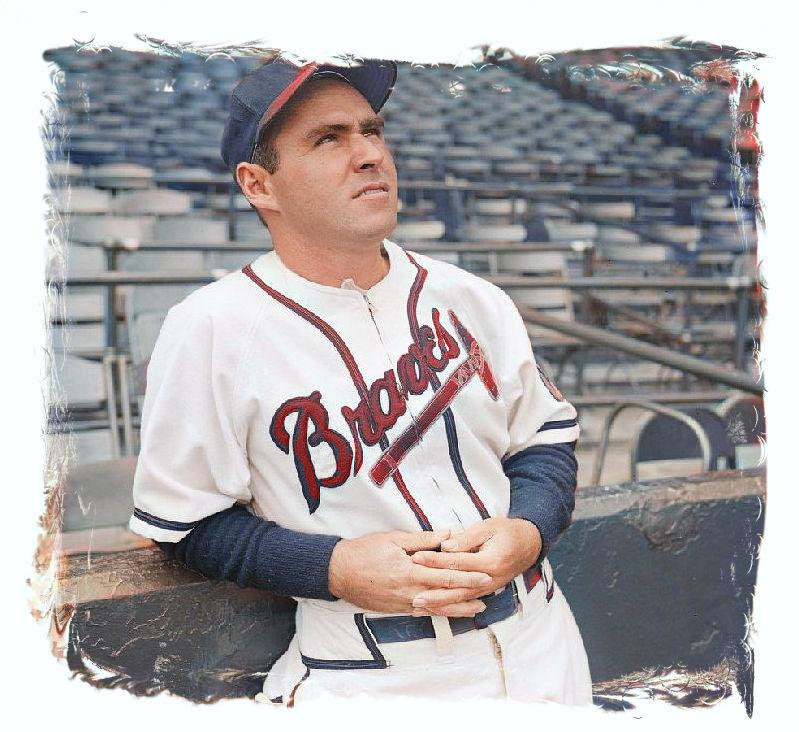 |
|
TOMMY HOLMES |
On August 17th, the Braves
traveled to New York to meet the Giants at the Polo Grounds. Behind the
six hit pitching of
Bill Voiselle, they trounced the Giants by a 10-2
score. The silent bats of the Braves finally became loaded with
tremendous power.
Clint Conaster
rattled a tremendous home run and a triple,
along with a single, to lead the 14 hit attack against three Giants pitchers.
After splitting with the Giants at the Polo Grounds, the Braves moved
on to Ebbets Field for another showdown with the Dodgers. The Braves got
knocked out of first place by percentage points, when the Dodgers took the
opening game of the doubleheader by an 8 to 7 score on
August 21st. Atop Ebbets
Field are the banners arranged in the standings of the National League. It
was a wild scene when the Braves banner was switched around for the one of
the Dodgers after the first game. The Braves had been wearing the crown
since June 13th, 69 days altogether.
But in slightly more than two hours,
Warren Spahn had slipped
his teammates back into their thin one-game lead with a four hitter and a
2 to 1 victory.
Spahn pitched one of his
best games of the season. He had a shutout until the ninth-inning and
allowed only but one man to reach second base.
Tommy Holmes
(.319 BA), who
hadn't knocked in a run in 23 games, drove in two runs in the first game.
On August 22nd, the Brooklyn
Dodgers stole eight bases, five in one inning, but the Braves won the game
on a clutch eight inning home run from
Clint Conaster. The Braves took
three games of the four game series, and as a result, they knocked
Brooklyn out of second place and moved on to St. Louis with a 2 1/2 game
lead over the Cardinals, and a three-game lead over the Dodgers.
Against the second place Cardinals and their ace, Harry Brecheen, the
Braves, led by
Tommy Holmes
(.319 BA)
increased their National League lead to 3 1/2 games in a 9-3 rout on
August 24th. The next day,
August 25th, the Braves opened up
more daylight on their two chief contenders for the National League lead,
behind
Warren Spahn's seven
hit, 2 to 0 shutout over the Cardinals. They had won five straight
from the Dodgers and Cardinals and were ahead by 4 1/2 games.
The team then moved on to Chicago and Pittsburgh and the Braves
lost six out of seven games to the Cubs and the Pirates. The team just
stopped hitting and left runners on base at an alarming rate (18 in the
Pittsburgh series). On
August 29th they dropped from the
top of the National League. The Braves appeared to be a listless
baseball team, returning from their road trip. As one National League
umpire said before the team left Cincinnati, he had never seen a team
fighting for a pennant with such a lack of enthusiasm.
They finished their road trip, taking 2 of 3 from Cincinnati, going 9-9
and in second place, 1/2 game behind the Dodgers.
|
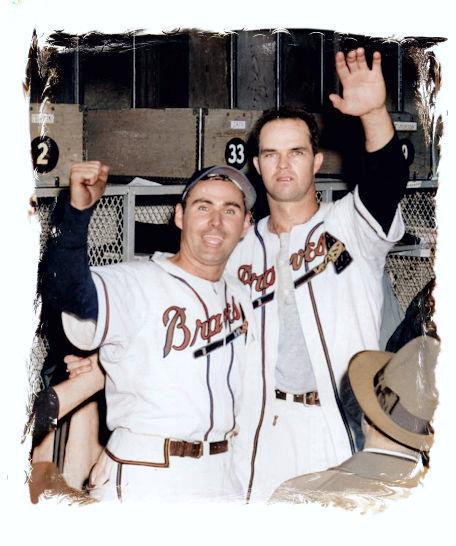 |
|
TOMMY HOLMES
& JOHNNY SAIN |
After a day off, the Phillies came to Braves Field and
Johnny Sain got his 17th
victory of the year, and just missed a shutout on
September 3rd. The win put
Braves back on top of the N.L., with the Dodgers losing both ends of a
doubleheader to the Giants.
On September 4th, after
blowing a 3 to 1 lead in the seventh inning of the first game, and
losing 4 to 3, the Braves bounced back to beat the Phillies 8 to 1.
The Tribe may well have had a double victory, but
Bill Voiselle
was the
victim of some ragged defense in the seventh inning of the opening game.
On September 5th,
Red Barrett
steered the Braves to a 5 to 1 victory over the Phillies.
Barrett, leading
2 to 1 in the fifth inning, rode on to a safer margin with the help of
Frank McCormick's three-run double to right. He chalked up his third
straight win and issued no walks for his second consecutive time.
The Braves took three of the four games with Philadelphia to move two
games out in front of the Dodgers. In their last five wins, Braves
pitchers had only allowed one run in each game.
And so, as the Dodgers came to Boston, the showdown series became one
of the most important ones that the Braves had played in years. And
nothing did the Tribe more good than the double victory over the Dodgers
at Braves Field on September 6th,
which gave them a four game lead over Brooklyn.
Warren Spahn pitched
perhaps the best game of the season, winning the opener 2 to 1 in 14
innings, allowing only five hits and picking Jackie Robinson off base two
times.
Torgeson's double in the 14th inning was the winning hit.
Johnny Sain then won the
seven inning nitecap 4-0, as the fans roared their approval to see the
Braves, for the first time in many long years, actually win games they
needed to win.
Two days of rain followed two days off in Philadelphia. Manager
Southworth
trotted out
Spahn and
Sain again and the two
aces again dominated the Phillies in sweeping both ends of a doubleheader
on
September 11th.
After splitting a
second doubleheader with the Phillies on
September 12th, the Braves came back to Boston.
They then beat the Cubs at the Wigwam, as
Johnny Sain won his 20th
game on September 14th.
And the on the next day,
September 15th,
Warren Spahn beat the
Cubs.
After a day off, the second place Pirates came to Braves Field on
September 17th and fell to
Sain (21-14).
And again on the next day, September
18th,
Spahn
(15-10) won again also.
Spahn and
Sain had won
eight of the last ten games that the Braves played.
On September 19th, the Braves came from behind to pin a 4 to 2
defeat on the Cincinnati Reds, in a game that saw
Eddie Stanky
come off the bench to deliver a base hit
that helped tied the score in the seventh inning. In doing so the Braves won
their six straight game and twelfth in their last thirteen outings.
The Braves were knocking at the door when they swept a doubleheader
from the Cardinals on September 21st.
Sain played an
integral part once more in winning his 22nd game of the season. The big
right-hander pitched his sixth complete game and got his sixth win in the
Braves' last eleven games in the opener.
They coasted to the pennant, which was clinched a week before the
season ended with a 3 to 2 victory over the Giants, on
September 26th in Boston.
Bob Elliott
belted a three run home run in the first inning that gave them the runs
they needed.
The Braves
celebrated proudly with the players pounding each other on the back as
Stanky
and
Southworth
hugged each other. It took 34 years, a dozen
managers and "Three Steam Shovels" to bring Boston the first National
League pennant since the legendary miracle men of
George Stallings. As the
Braves fanatics whooped it up after last out, to the band playing
"Tessie", a lone figure was seen moving slowly off the playing field. He
had on a New York Giants uniform but was weeping tears of joy. His name
was Hank Gowdy and he was a hero of the 1914 World Series victory over the
Athletics. He was not a part of the victory celebration, but he could not
keep back the floodgates of the memory.
It was Stan Musial and not
Johnny Sain who was voted
the National League's most valuable player for 1948. But in a period of 19
days, from September 3rd to September 21st,
Sain had pitched and won
six games for the Braves.
The Braves went into the World Series against Cleveland with one of
their heaviest hitters on crutches.
Jeff Heath
broke his ankle sliding
home at Brooklyn four days before the season ended. He had batted .310 and
walloped 20 homers, while knocking in 77 runs.
Although tired after winning a six-game series to put them in a playoff
with the Red Sox, the Indians were favored to win the World Series, having
a more younger and better balanced team than the Braves. The Indians came
through because, while the Braves pitching was good, their pitching was
excellent.
In Game #1 at Braves Field,
Johnny Sain pitched the
Braves to a 1 to 0 victory. The man showed that he was a much more
resourceful pitcher than his counterpart Bob Feller, thanks to an
eighth-inning single by
Tommy Holmes. For seven
innings
Sain and Feller had
matched each other and were tossing a shutout. It seemed that this game
might go into overtime, so brilliant were the ace right-handers, each of
whom was tops in their respective league.
Bill Salkeld
was the first Braves hitter in the last of the eighth he
went down to first base on a base on balls.
Phil Masi
came in to pinch run
for
Salkeld
at first. Mike McCormick laid down a perfect bunt on the first
pitch. As Feller threw
McCormick
out at first,
Masi
scooted down to
second.
Sain then lined out to
Walt Judnich, in right field. That brought
Holmes
to the plate and
he drove a low line drive to the right of Ken Keltner at third. It was
going safely into left field and
Masi
took off like a shot and with his
cap in his hand, he scored the one and only run of the game which turned
out to be the game-winner.
Sain yielded only four
hits and they were all singles. He was cool, tough, and delivered in
the clutch. He felt that one run would be all that he needed. Never
was it better than when it happened in the eighth-inning.
Game #2 went to the Indians, a 4
to 1 victory. The Indians found
Warren Spahn to be a
pushover. He pitched three scoreless innings and then started slipping in
the fourth, fading out of the picture by the fifth inning.
Spahn pitched a perfect
opening inning, and in the bottom half, the Braves were the first to
crack open the game when
Dark
came up and slapped a roller at Joe Gordon. Gordon fumbled it for an
instant, but it was enough for the speedy
Dark
to beat his throw. The
Braves took advantage and didn't hesitate to cash in.
Earl Torgeson
took a called strike and then lined a single to right, allowing
Dark
to get over to third. That
seemed to shake up Lemon, who fired two balls to
Bob Elliott. On the next
pitch Bob slashed it vigorously over Boudreau's head for a clean
single and
Dark
walked home with the first run of the game.
But after that they were throttled by Bob Lemon.
The Braves put the pressure on him in the second inning, the fourth and
the sixth inning, but he took care of the Tribe in the clutch, baffling
them with a sinker ball that was very effective.
Lou Boudreau was the leadoff hitter for the Indians in the fourth. He
pushed a ball into right field for a double and that brought up Gordon. He
atoned for his miscue and pulled a single into left field. Boudreau was
off with the crack of the bat and didn't stop as he turned third. There
wasn't even a chance to nail him and Gordon took off for second, as
Torgeson
cut off the ball and the game was tied. Working carefully,
Spahn eliminated Ken
Keltner on a foul pop up, but Larry Doby, who had doubled off
Spahn in the second
inning, came through again, as
Spahn got himself in a
three and one hole. On the next pitch Doby sent a line drive into right
field that scored Gordon and put the Indians ahead.
Lou Boudreau was a one-man show. He not only scored the first Cleveland
run but knocked in the game clincher. Dale Mitchell opened the fifth with
a single to left. Allie Clark sacrificed him over to second and that
brought up Boudreau.
Spahn got in the hole,
three and one, and then Lou drove the next serve back through the box into
centerfield, scoring Mitchell with the third Cleveland run.
The Braves committed three errors in the game and allowed the Indians
to run them out of the park. They permitted a cheap fly ball to fall in
for a hit and run and looked like a jittery sandlot baseball team rather
than a club fighting for the world title.
In Cleveland, Gene Bearden, who pitched the Cleveland Indians
into the World Series, put his club within two games of winning it. Four
days after he put down the Red Sox in the American League showdown, he
blinded the Boston Braves with a dipping knuckleball in
Game #3. He shut the Braves out, 2
to 0, giving his team a 2 to 1 edge in the series.
Bearden was a one-man show, shutting out the Braves on 85 pitches and
he scored the first run for his team. He got two of the five Indians hits,
his first being a double in the third inning, and the other knocking out
his rival,
Vern Bickford, in the fourth inning. The Braves had few scoring
chances as Ken Keltner started one doubleplay and Bearden started another.
Eddie Stanky
was the only Braves player to reach third base during the
whole game. Bearden struck out four and registered six putouts with his
glove.
The Indians Steve Gromek, who had been largely forgotten, hurled his
team to a 2 to 1 win over the Braves in
Game #4. The Indians gained their
third victory for a 3 to 1 series lead on Larry Doby's monstrous 400 foot
home run off
Johnny Sain in the third
inning.
Sain pitched a neat five
hitter but didn't win the game as his teammates could not hit the ball at
the opportune times to get runs across.
Once again the Braves were futile with their bats. They managed to slap
out seven hits, only two more than the Indians got off
Sain. But with men in
scoring position, Gromek and his knuckle half curveball bewildered the
Braves. Two times,
Bob Elliott, the
1947 MVP of the National League and leading RBI man on the team this year,
had a chance to put the Braves back in the game and didn't come through.
Outside of a few pitches, both pitchers were just about
perfect. They each served up a home run ball but
Sain had better
control. Once more he didn't walk a batter, but he got off to a rough
start when the Indians got to him for two hits and their initial run in
the first inning. Working with only two days rest, a normal procedure for
Sain over the
past two months, his curveball didn't have the bite in the cold biting
wind. He had blanked the Indians on four hits only three days ago, but his
scoreless stretch was shattered in the first inning.
|
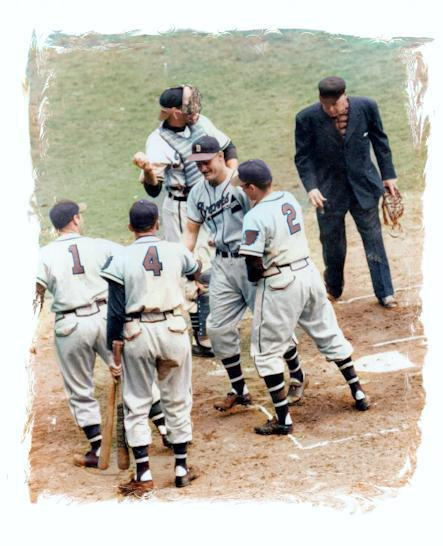 |
|
BOB ELLIOT HRs TWICE |
In Game #5, the Braves carried
the World Series back home back to Boston, with an 11-5 scalping of the
Indians.
Bob Elliott
led the assault
on Bob Feller by ripping him for two home runs.
Warren Spahn came into
the game as a reliever, and threw a magnificent 5 2/3 innings simply
freezing the bats of the red-hot ball club. He pitched like the cool
effective craftsman, who was a 21 game winner a year ago, as well as the
clutch performer against the Dodgers and the Cardinals during the pennant
run.
The game was tied until the Braves seventh, when the Boston Tribe broke
it open.
Holmes
singled to left
center and Dark
sacrificed him to second.
Earl Torgeson
then slammed a clean single to center, scoring
Holmes
and putting the
Braves up. That was it for Feller and in came Ed Klieman. The first batter
he faced was
Elliott, who he walked,
moving
Torgeson
up to second base. Marv Rickert then lined a single to
center that scored
Torgy
and Larry Doby tried to cut off
Elliott, who was heading
into third. But Doby's throw flew over Ken Keltner's head into the Boston
dugout. So
Elliott
walked home and
Rickert was waived over to third-base. The next batter was
Bill Salkeld,
who Kleiman also walked, so Boudreau handed the ball over to Russ
Christopher, who also failed to hold the Braves.
Mike McCormick he lined a
single into right. Rickert scored and
Salkeld
had plenty of time to glide
to third.
Eddie Stanky
got the hit-and-run sign and he tossed his bat
toward the ball, catching it and floating it out to right-field, allowing
Salkeld
to score and
McCormick
to race over to third, and that was it for
Christopher. So, now striding in from the right-field bullpen, was none
other than Satchel Paige.
The crowd howled and cheered as he warmed up. His first batter was
Spahn
and he pulled
a long fly out to Doby in center, that scored
McCormick
from third with
the sixth and final run of the inning. The big lead was all that
Spahn needed as he
retired Indians in order in the seventh and set down nine men in a row,
striking out five of the last six batters in the ball game.
|
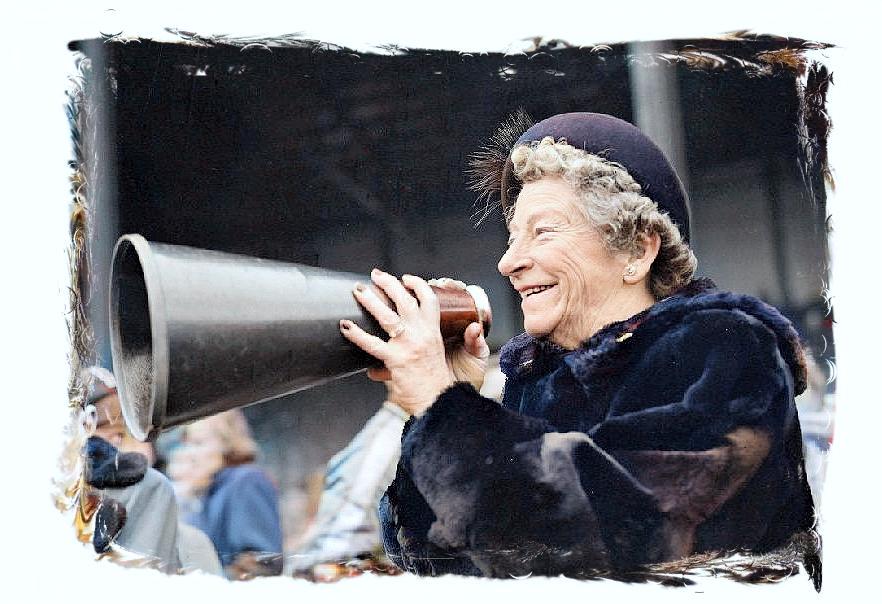 |
|
LOLLY HOPKINS |
For the first time in 28 seasons, the Indians stood on top of the
baseball world as they defeated the Boston Braves 4-3 in
Game #6 at Braves Field in
front of 40,103. The game was a microcosm of the Indians� season,
good offense and starting pitching but a late rally by the opposition
tested the Tribe�s mettle and
Gene Bearden saved the day.
A backfiring bunt brought the Series to a dramatic, but dismal finish, for
the Braves. When Jim Hegan grabbed
Sibbi Sisti's pop up in the
ninth-inning and converted it into a doubleplay, Cleveland won the game
and the World Series, four games to two.
The Braves waged an excellent struggle, to make the game one of the
most exciting in the series. They missed winning it in the eighth, when
Phil Masi's double to left, fell short of clearing the fence by a few
feet. As Bob Kennedy caught
Tommy Holmes' fly ball in
left field to end it all, the Indians celebrated. Several of the Indians
players ganged up on Gene Bearden and started to carry him off the field
and then went off into the darkness of the dugout and locker room.
Previous Braves opportunities and failures were forgotten as the Tribe
started swinging on Bob Lemon in the eighth-inning. Down 4 to 1,
Tommy Holmes
opened the
inning by slicing the first serve to left for single.
Alvin
Dark
took a healthy cut at
a two and one pitch, but lined it straight at Larry Doby for the first
out. The fans' groans changed abruptly to screams and cheering when
Earl Torgeson
slammed the first pitch he saw down the right-field line for a
double and
Holmes
steamed into third
base. Lemon pitched carefully to
Bob Elliott, who already had
three singles, and got him up to a three and two count before walking him.
Marv Rickert was the next schedule hitter and manager Lou Boudreau
brought in southpaw Gene Bearden to pitch.
Billy Southworth
countered by
bringing
Clint Conaster
up to the plate. Bearden was nervous, as this was
as tough a spot as he hand been in, during the hectic eight-day span. He
was off the plate with his first two pitches and the next one was called a
strike.
Conaster
then connected with a fastball and sent it soaring close
to 400 feet, where it went dead and Thurman Tucker corralled it. After the
catch,
Holmes
scored and
Torgeson
was able to trot down to third.
Southworth
was then playing percentages to get a base hit. He sent up
Phil Masi
to bat for
Bill Salkeld
and when Phil hit the second pitch, for
a moment it looked like it would be a home run to win the ballgame. But
the ball struck the wire screen separating the two fences in left field
and bounced straight down to Dale Mitchell.
Elliott
had to halt at third
as Masi
scooted down to second.
Mike McCormick came up next and slammed the ball hard but straight at
Bearden, who flipped it over to Earl Robinson to end the threat. For the
second straight Monday afternoon the Indians carried the slim, rookie
southpaw off the field on their shoulders. A week ago his teammates
carried Bearden off the field when he threw a complete game against the
Boston Red Sox in a one-game playoff for the American League pennant.
Today, the carried the Purple Heart recipient off the field after getting
the last five outs of the season and protecting a lead en route to a World
Series title.
The Braves had been in the limelight from opening day, when they gave
the fans a new electric scoreboard and inaugurated "Jimmy Fund" day, the
charity to help children with cancer that is still a hallmark of Boston
sports to this very day.
The Braves set their Boston attendance record at 1,455,438 despite
miserable weather in the spring. By the end of 1948, it seemed that the
Braves had established themselves as powerful competitors of the Red Sox
in the favor of the Boston public. But the pennant conquest of 1948 was
the last convulsive effort of a dying giant, the last flaming eruption of
a volcano before it goes silent.
| 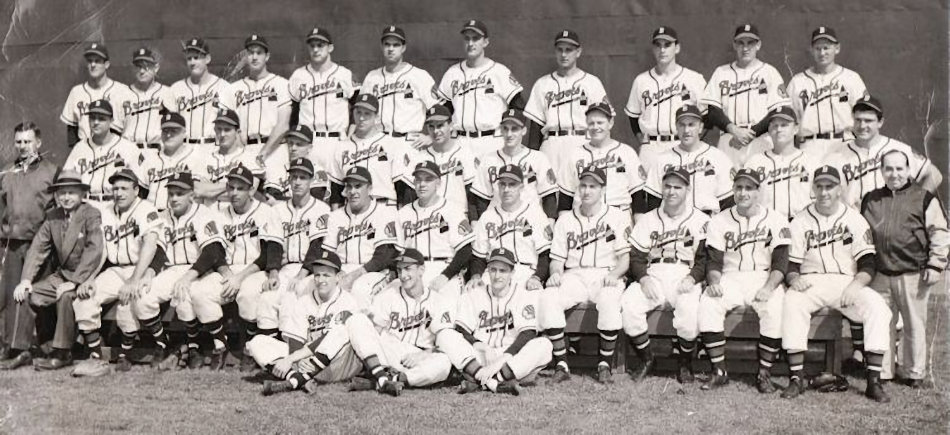


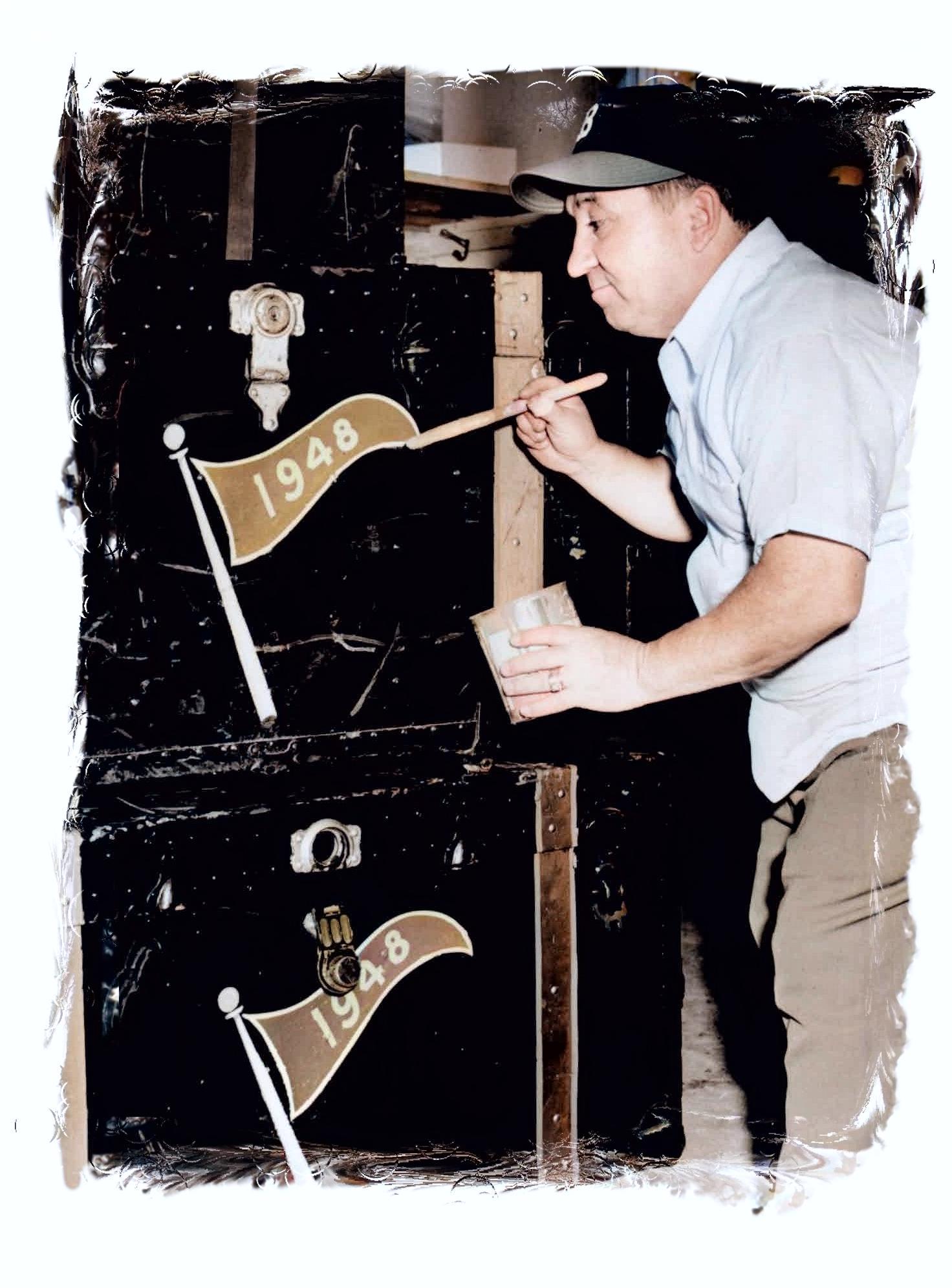

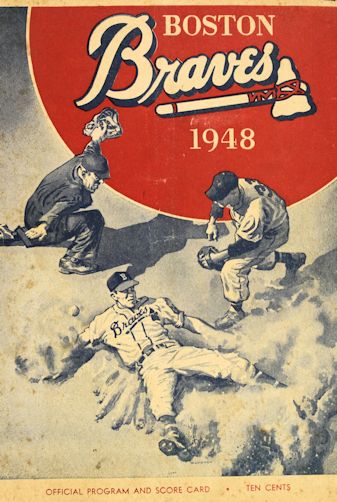


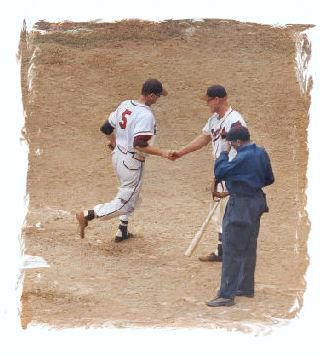





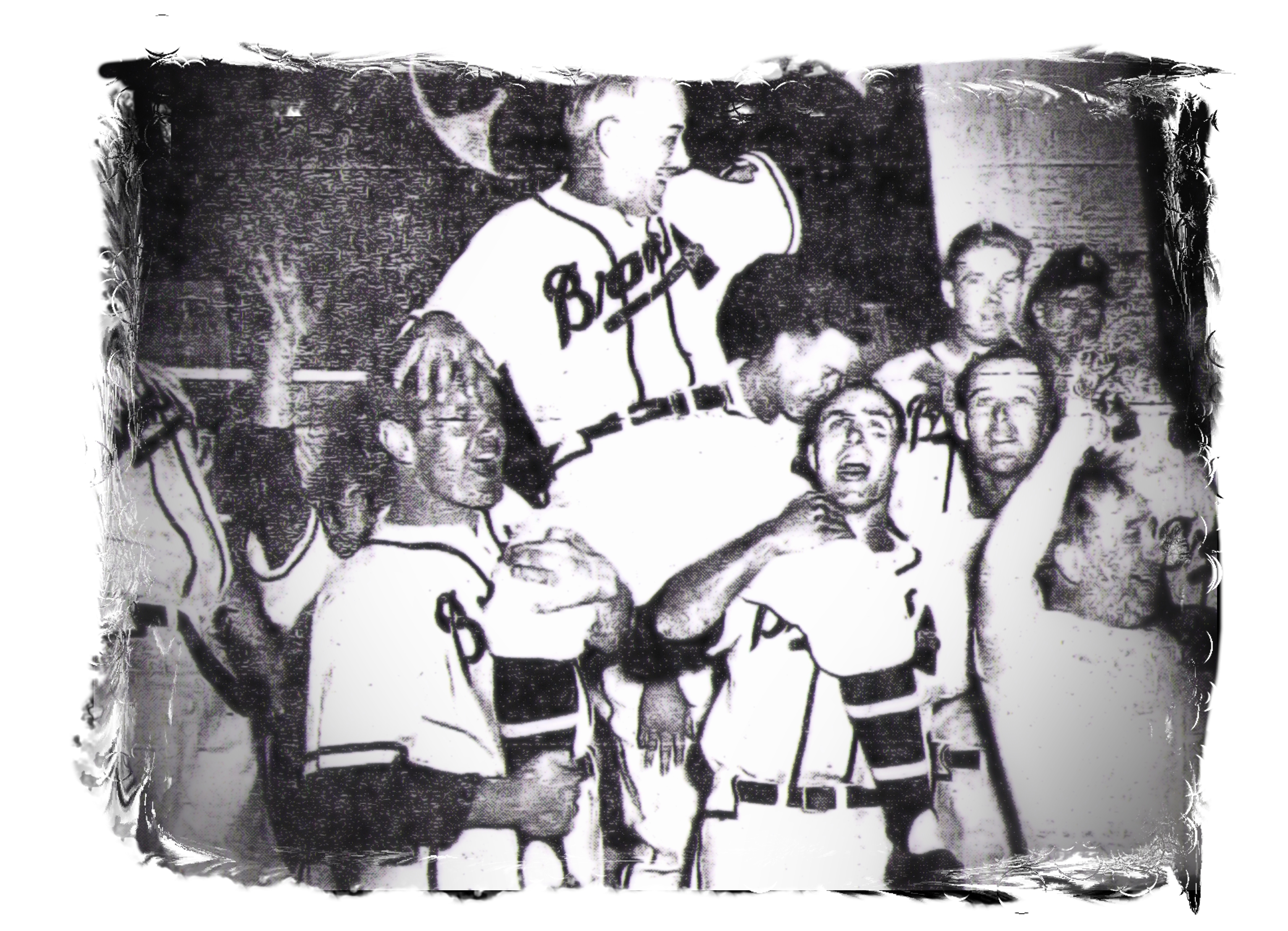
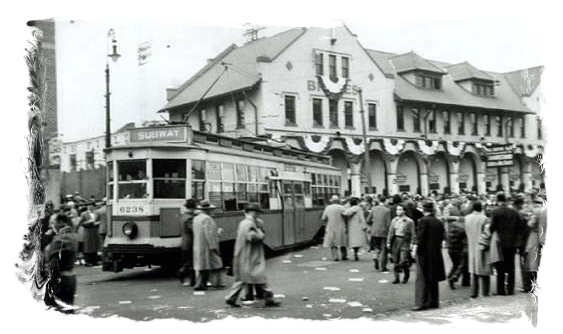
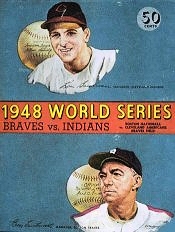
.jpg)



